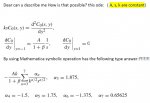Hi Dears May anyone describe me how it can possible the ode solve in following form using mathematica?!
In the following, A, s, and k are constants.
. . . . .\(\displaystyle \large{ ksC_0(s,\, y)\, =\, \dfrac{d^2 C_0(s,\, y)}{dy^2}, }\)
. . . . .\(\displaystyle \large{ \dfrac{dC_0}{dy}\, \bigg|_{\,y = -1}\, =\, \dfrac{A}{1\, +\, \beta}\, \dfrac{1}{s},\, \mbox{ }\, \dfrac{dC_0}{dy}\, \bigg|_{\,y = 1}\, =\, 0 }\)
By using Mathematica symbolic operation has the following type answer: ?!!
. . . . .\(\displaystyle \large{ -\, \dfrac{Ak}{1\, +\, \beta}\, }\)\(\displaystyle \large{ \displaystyle \sum_{n = 3}^7\, }\)\(\displaystyle \large{ \dfrac{\alpha_n}{k^{n/2}\, s^{n/2}},\, \alpha_3\, =\, 1.875, }\)
. . . . .\(\displaystyle \large{ \alpha_4\, =\, -1.5,\, \alpha_5\, =\, 1.75,\, \alpha_6\, =\,-1.375,\, \alpha_7\, =\, 0.65625 }\)
In the following, A, s, and k are constants.
. . . . .\(\displaystyle \large{ ksC_0(s,\, y)\, =\, \dfrac{d^2 C_0(s,\, y)}{dy^2}, }\)
. . . . .\(\displaystyle \large{ \dfrac{dC_0}{dy}\, \bigg|_{\,y = -1}\, =\, \dfrac{A}{1\, +\, \beta}\, \dfrac{1}{s},\, \mbox{ }\, \dfrac{dC_0}{dy}\, \bigg|_{\,y = 1}\, =\, 0 }\)
By using Mathematica symbolic operation has the following type answer: ?!!
. . . . .\(\displaystyle \large{ -\, \dfrac{Ak}{1\, +\, \beta}\, }\)\(\displaystyle \large{ \displaystyle \sum_{n = 3}^7\, }\)\(\displaystyle \large{ \dfrac{\alpha_n}{k^{n/2}\, s^{n/2}},\, \alpha_3\, =\, 1.875, }\)
. . . . .\(\displaystyle \large{ \alpha_4\, =\, -1.5,\, \alpha_5\, =\, 1.75,\, \alpha_6\, =\,-1.375,\, \alpha_7\, =\, 0.65625 }\)
Attachments
Last edited by a moderator:

